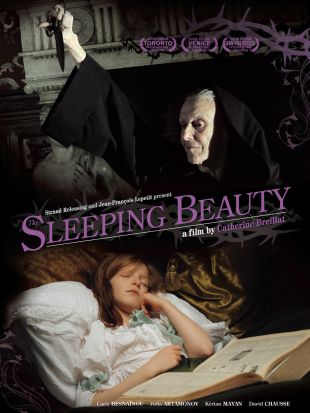
French provocateur Catherine Breillat returns to her recent territory of eroticized, fractured fairy tales with The Sleeping Beauty (La Belle Endormie) but finds no new fertile ground to explore. Following as it does Breillat's far more interesting Bluebeard (2008), the movie disappoints on all levels.
The picture opens with the familiar tale of Anastasia (the title character), who receives a curse from a witch during infancy -- death from a hand-prick on a yew tree at age 16. Three fairy godmothers soon intervene, and transmute the spell without the witch's knowledge; now, instead of dying at 16, Anastasia will prick herself at age 6, sleep for 100 years, and wake up in contemporary times at age 16. Breillat basically uses this framework as an excuse on which to hang an associative phantasmagoria that takes place inside the little girl's head while she dozes.
The oneiric section of the film -- which runs almost an hour out of its 82 minutes -- only succeeds at being incoherent. Six-year-old Anastasia wanders through one set piece after another, and events unfold at random, with only the vaguest connecting threads. Episodes include a run-in with a swarthy, boil-covered guard who promises to eat the little girl unless she succeeds at knocking over some bones with a human skull; a visit to a train stop guarded by a dwarf conductor who threatens to throw Anastasia behind bars; and Anastasia's emotionally incestuous relationship with an older boy who temporarily becomes her adopted brother -- and who meets a fanciful destiny.
Other directors, such as Fellini and Lynch, have succeeded at setting up fractured narratives such as this, but (as in Fellini Satyricon) a cohesive underlying vision typically exists -- a thematic homogeneity that gives life to the free-floating narratives. But The Sleeping Beauty is entirely a random grab bag of sequences. It will strike the average viewer as metaphor-packed cinematic psychobabble -- inscrutable when it intends to be profound. Among other liabilities, Breillat laces the movie with howlingly pretentious dialogue, such as "You can tie all the winds of the world together," and "May the rampant dragon bite the tail of the winged dragon."
Breillat doubtless has ideas that she wants to convey, but she does a lousy job of bringing them off here. This isn't simply a tedious, meandering, and ill-conceived movie, it's excruciatingly boring, which represents a first -- and, hopefully, a last -- for the gifted director of Romance and 36 Fillette.
